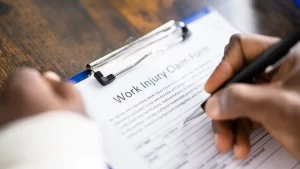
When you file a workers’ compensation claim in Minnesota, your employer and their insurance company can request access to a wide range of information about you. They can ask for your medical records, employment history, and other personal details. Knowing what a workers’ compensation records request involves helps you prepare for the process and protect your privacy.
What Is the Workers’ Compensation Medical Records Disclosure Act?
The Workers’ Compensation Medical Records Disclosure Act is a federal law that sets guidelines for releasing and using medical records in workers’ compensation cases. This act balances the need for employers and insurers to access relevant medical information with the employee’s right to privacy.
Under the Workers’ Compensation Medical Records Disclosure Act, employers and their insurers can request medical records that pertain directly to the work-related injury or illness. This includes:
- Doctor’s notes and medical reports
- Diagnostic test results
- Treatment plans and medication lists
- Bills and receipts for medical expenses
In addition to records directly related to your work injury, employers and insurers may also request information about pre-existing conditions or previous injuries that could affect your current claim. For example, if you have a history of back problems and you file a claim for a work-related
How Far Back Can a Workers’ Compensation Records Request Go?
Workers’ compensation records retention requirements vary by state. In Minnesota, employers must keep workers’ comp records for six years after the injury or illness occurs or the last payment of benefits, whichever is later. However, in a workers’ compensation records request, the insurer may seek medical records from long before your current injury if they suspect a pre-existing condition.
What Non-Medical Records Can Be Requested?
In addition to medical records, a workers’ compensation records request may seek information about your employment history, education, and training. This could include:
- Performance reviews and disciplinary actions
- Attendance records and time cards
- Vocational assessments and job descriptions
- Pay stubs and tax returns
The insurer may use this information to determine your wage-earning capacity and calculate your benefits.
Can They Access My Personal Life in a Background Check?
While a workers’ compensation records request primarily focuses on medical and employment records, insurers sometimes seek information about your personal life as well. They might review your social media profiles, conduct background checks, or even hire a private investigator to observe your daily activities.
This level of scrutiny often aims to catch claimants engaging in activities inconsistent with their reported injuries. However, it can feel like a significant invasion of privacy.
How Long Can You Stay on Workers’ Comp in Minnesota?
In Minnesota, you can receive workers’ comp benefits until you reach maximum medical improvement (MMI) or return to work, whichever comes first. If you have a permanent partial disability, you may be eligible for ongoing benefits based on the severity of your impairment.
What Is the Waiting Period for Workers’ Comp in Minnesota?
Minnesota’s waiting period for workers’ comp benefits is three calendar days. If your disability lasts longer than ten days, you can receive payment for those first three days as well.
Are Workers’ Compensation Records Public?
In most cases, workers’ compensation records are not public. Only parties directly involved in the claim, such as the employer, insurer, and medical providers, can access these records. However, if your case goes to trial or appeal, some information may become part of the public court record.
What Is an Authorization for Release of Workers’ Compensation Records?
 An authorization for the release of workers’ compensation records is a form you sign to allow your medical providers to share information with your employer, their insurer, and other parties involved in your claim. Read these forms carefully and only sign if you understand and agree with the terms.
An authorization for the release of workers’ compensation records is a form you sign to allow your medical providers to share information with your employer, their insurer, and other parties involved in your claim. Read these forms carefully and only sign if you understand and agree with the terms.
Contact Robert Wilson & Associates Today
Remember, your workers’ compensation claim is not just a legal process—it’s a critical juncture that can profoundly impact your life, health, and future. While employers and insurers are entitled to request relevant information to assess your claim, their interests may not always align with yours. Navigating the complexities of these requests can be daunting, especially when your well-being is at stake.
This is where having an experienced Minnesota workers’ compensation claim attorney on your side becomes invaluable. Our team at Robert Wilson & Associates understands the intricacies of workers’ compensation laws and the tactics often employed by insurers. We’re not just here to protect your legal rights but to be your advocates, allies, and voice throughout this process.
If you’re feeling overwhelmed or uncertain about the workers’ compensation records request process, don’t hesitate to reach out to us. Our initial consultations are free, and we’re here to provide guidance, support, and advocacy every step of the way. Call (612) 334-3444 or contact us through our online form today to schedule your free consultation. Learn more about our recent successes to know why you should trust us.